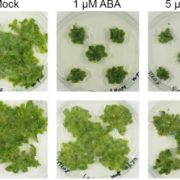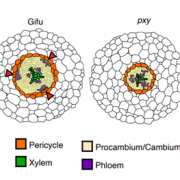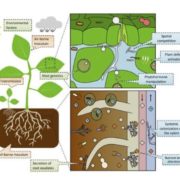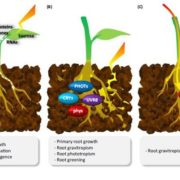Insect herbivory selects for volatile-mediated plant-plant communication ($) (Current Biology)
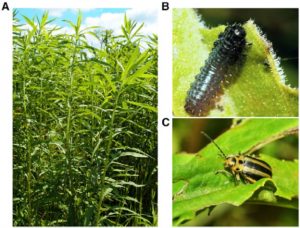 Plants release volatile organic compounds (VOCs) in response to insect herbivory. The potential for VOCs to serve as diffusible signals has long been recognized. For example, VOCs can signal neighbors to prime for defense, signal distant parts of the emitting plant, and even attract predatory insects to help defend the plant. How do VOCs affect plant fitness, and how does predation select for VOC production or response? Kalske et al. investigated these questions by testing the effect of VOC emissions on neighboring plants when the receiving plants were from a population that had either been or not been subject to herbivory for the past 12 years. Plants exposed to herbivory were responsive to emitter plants whether or not they were genetically identical, whereas those that hadn’t had pressure from herbivores were more restricted in their responses. Furthermore, the blend of VOCs produced was more similar in the populations that had been exposed to herbivory. This study shows that herbivory drives the evolution of plant-plant communication, favoring an open-channel model, and also that plants can be good models for the study of the evolution of communication. (Summary by Mary Williams) Curr. Biol. 10.1016/j.cub.2019.08.011
Plants release volatile organic compounds (VOCs) in response to insect herbivory. The potential for VOCs to serve as diffusible signals has long been recognized. For example, VOCs can signal neighbors to prime for defense, signal distant parts of the emitting plant, and even attract predatory insects to help defend the plant. How do VOCs affect plant fitness, and how does predation select for VOC production or response? Kalske et al. investigated these questions by testing the effect of VOC emissions on neighboring plants when the receiving plants were from a population that had either been or not been subject to herbivory for the past 12 years. Plants exposed to herbivory were responsive to emitter plants whether or not they were genetically identical, whereas those that hadn’t had pressure from herbivores were more restricted in their responses. Furthermore, the blend of VOCs produced was more similar in the populations that had been exposed to herbivory. This study shows that herbivory drives the evolution of plant-plant communication, favoring an open-channel model, and also that plants can be good models for the study of the evolution of communication. (Summary by Mary Williams) Curr. Biol. 10.1016/j.cub.2019.08.011



